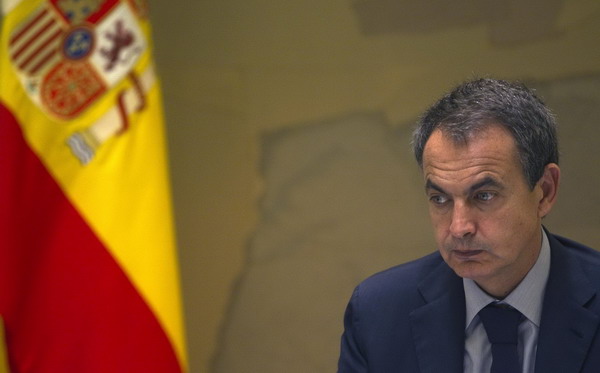Economy
Spain to offer bonds as ECB meets amid crisis
Updated: 2011-08-04 10:54
(Agencies)
|
 Spain's Prime Minister Jose Luis Rodriguez Zapatero reacts as he presides over a meeting with his economic group at the Moncloa Palace in Madrid August 3, 2011. Spain's Prime Minister and Economy Minister hold a crisis meeting on the economy on Wednesday, as the country seeks a way to calm the concerns of investors driving its debt costs ever closer to unsustainable levels. [Photo/Agencies]
|
Spanish Economy Minister Elena Salgado, speaking on Wednesday night after a crisis meeting on the economy with Prime Minister Jose Luis Rodriguez Zapatero, said the bond sale would take place as scheduled despite a surge in Spanish and Italian bond yields to 14-year highs in the past several days.
"We think the tensions will last a few more days, but the bond auction will go ahead on Thursday," Salgado said.
The yield on Spain's 10-year bonds climbed as high as 6.50 percent on Wednesday because of investor doubts about Madrid's ability to continue financing its debt over the long term, before drifting back to close at 6.27 percent.
Analysts say that if yields go much higher and stay there for months, markets could force Spain, the euro zone's fourth biggest economy, to follow Greece, Ireland and Portugal in seeking an international bailout.
"Hearing Zapatero had cancelled his holidays showed the situation was desperate. The 7 percent (yield) mark is a psychological barrier and is just not sustainable because it's far too costly to finance at these levels," said Jo Tomkins, analyst at consultancy 4Cast.
The ECB holds its monthly policy meeting in Frankfurt on Thursday and investors are hoping it will offer some form of reassurance to financial markets.
Euro zone leaders agreed at a summit last month to give the bloc's bailout fund sweeping new powers to help indebted states and intervene in the bond market, but the changes are unlikely to be passed by national parliaments until late September at the earliest. So for now, the ECB may be the only institution able to act quickly and powerfully to defend the euro zone.
Fund managers think the ECB may decide on Thursday to reactivate its emergency programme to buy bonds of weak states from the secondary market. The plan, deeply disliked by some ECB policymakers for compromising the central bank's core mission of controlling inflation, has been suspended for over four months.
If the ECB does not revive the programme, central bank president Jean-Claude Trichet may at least indicate willingness to use it if the crisis worsens, some analysts believe.
The ECB, which has raised official interest rates twice this year, may also signal it will put any further tightening on hold because of slowing economic growth in the euro zone and globally, even though inflation is well above target.
E-paper

Double vision
Prosperous Hangzhou banks on creative energies to bridge traditional and modern sectors
Minding matters
A touch of glass
No longer going by the book
Specials

Ancient plate broken
An ancient porcelain plate was accidentally destroyed during a research in the Palace Museum.

Selfless actions
A 20-year-old girl becomes an Internet star for giving her first kiss to a drowning old man.

Space race
Homebuyers are learning the hard facts of supply and demand: too many cars and too few parking spaces.
